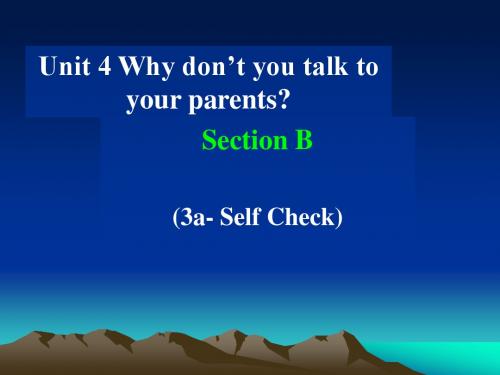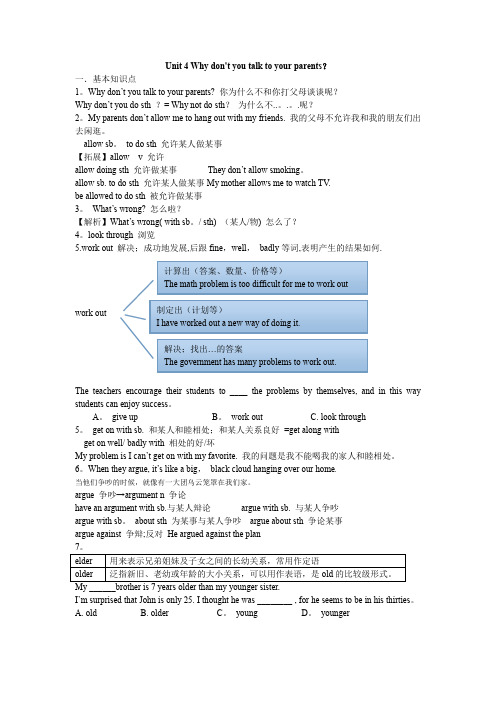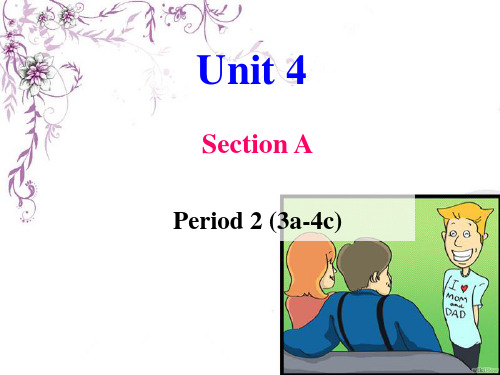八年级英语下册-Unit-4-Why-don't-you-talk-to-your-parents(第1课时)教学设计-(新版)人教新目标版
- 格式:doc
- 大小:1.52 MB
- 文档页数:13


Unit 4 Why don't you talk to your parents?一.基本知识点1。
Why don’t you talk to your parents? 你为什么不和你打父母谈谈呢?Why don’t you do sth ?= Why not do sth?为什么不..。
.。
.呢?2。
My parents don’t allow me to hang out with my friends. 我的父母不允许我和我的朋友们出去闲逛。
allow sb。
to do sth 允许某人做某事【拓展】allow v 允许allow doing sth 允许做某事They don’t allow smoking。
allow sb. to do sth 允许某人做某事My mother allows me to watch TV.be allowed to do sth 被允许做某事3。
What’s wrong? 怎么啦?【解析】What’s wrong( with sb。
/ sth) (某人/物) 怎么了?4。
look through 浏览5.work out 解决;成功地发展,后跟fine,well,badly等词,表明产生的结果如何.The teachers encourage their students to ____ the problems by themselves, and in this way students can enjoy success。
A。
give up B。
work out C. look through5。
get on with sb. 和某人和睦相处;和某人关系良好=get along withget on well/ badly with 相处的好/坏My problem is I can’t get on with my favorite. 我的问题是我不能喝我的家人和睦相处。

初中英语重点单词(下册Unit 4 Why don’t you talk to your parents?)知识梳理allow v. 允许;准许wrong adj. 错误的;不对的guess v. 猜测;估计deal n. 协议;交易relation n. 关系;联系;交往communication n. 交流;沟通argue v. 争吵;争论cloud n. 云;云朵elder adj. 年纪较长的instead adv. 代替;反而;却whatever pron. 任何;每一nervous adj. 焦虑的;担忧的offer v. 主动提出;自愿给予proper adj. 正确地;恰当地secondly adv. 第二;其次communicate v. 交流;沟通copy v. 复制;复印return v. 回来;回去member n. 成员;分子pressure n. 压力compete v. 竞争;对抗opinion n. 意见;想法;看法skill n. 技艺;技巧typical adj. 典型的football n. 足球continue v. 持续;继续存在compare v. 比较crazy adj. 不理智的;疯狂的push v. 推动;移动development n. 发展;发育;成长cause n. 造成;引起usual adj. 通常的;寻常的perhaps adv. 可能;大概;也许二、重点单词【单词学习】1. allow v. 允许;准许【用法】(1)allow sb. to do sth. 允许某人做某事(2)allow (doing)sth. 允许(做)某事(3)be allowed to do sth. 是allow sb. to do sth.的被动结构,意为:被允许做某事。
【例句】His parents don’t allow him to go out at night. 他父母不允许他晚上出去。

Unit 4 Why don’t you talk to your parents【解析】Why don't you do sth. = Why not do sth. 为什么不......呢【拓展】用于提建议的句型有:(1) What about doing sth. =How about doing sth. ….怎么样(2) Why don’t you do sth.= Why not do sth. 为什么不呢(3) Let’s do sth. 让我们一起做某事吧。
(4) Shall we/I do sth. 我们做…好吗(5) had better do/not d o sth. 最好做/不做某事(6) Will/Would you please do sth. 请你做…好吗(7) Would you like t o do sth. 你想去做某事吗(8) Would you mind doing sth.你介意做某事吗【回答】(1). 同意对方的建议时,一般用:◆ Goo d idea. / That’s good idea. 好主意◆OK/ All right. / Great. 好/ 行/太好了◆ Yes, please. / I’d love to. 是的/ 我愿意◆ I agree with you. 我同意你的看法◆ No problem. 没问题◆Sure./ Of course./ Certainly. 当然可以◆Yes, I think so. 对,我也这样想(2).对对方的帮助或要求表示委婉谢绝时,一般用:◆ I don’t think so. 我认为不是这样◆Sorry, I can’t. 对不起,我不能◆I’d love to, but…我愿意,但恐怕……【解析】allow sb.. to do sth. 允许某人做某事【拓展】allow v 允许allow doing sth. 允许做某事They don’t allow smoking.allow sb.. to do sth. 允许某人做某事My mother allows me to watch T V.【解析】What’s wrong( with sb../ sth.) (某人/物)怎么了【解析】go to sleep 去睡觉(强调“入睡,睡着”这一动作)这一状态)【解析】look 看起来(系动词,后跟形容词作宾语)【拓展】:系动词:后跟adj.作表语一是:(be)am /is /are be quiet=keep quiet 保持安静二保持:stay/keep (表示持续状态)stay healthy=keep healthy 保持健康三变化:become/get/turn (表示状态变化)【解析】call up (v + adv) call on 拜访;号召【解析】find sb.. doing sth. 发现某人正在做某事Mr. Wang found Li Dong reading a storybook in the class.类似动词:hear,watch, see, feel【解析】be angry with sb.. 生某人的气【拓展】angry adj.生气的→ angrily adv. 生气地(1)be angry with sb.. =be mad at sb.. 对某人生气【with后接人】(2)be angry at/about sth.对某事感到生气【at后接事】(3)be angry to do sth. 做某事感到生气10. It’s not a bi g deal. 没什么大不了;不是什么大事(常用于口语中)You left your homework at home. 你把作业忘在家里了。


Unit 4 Why don't you talk to your parents?Period1 section A(1a-2d)导学案一自主学习I 基础单词1 guess_____2 deal_____3 允许;准许_____4 错误的;不对的________II 核心单词1 hang out_______2 have a fight with .____________3 give back to .________4 允许某人做某事_________5 浏览___________6 成功地发展;解决___________二合作探究重要句型1 My parents don't_____me ____ ____ ______with my friends.我父母不允许我和朋友闲逛。
2 What's ________? 怎么啦?I'm really tired because I studied______midnight last night. 我十分累因为做外我学习到很晚。
3 ______ ______ you go to sleep earlier this evening?今晚你为什么不早早睡觉呢?4 Hope things ____ ____ . 但愿情况会好起来。
三达试标测单选 1 _____help your good friend? I can't understand you.A Why not youB Why don'tC Why don't youD Why don't2 If you will know the news quickly, you may____the website quickly first.A look upB look throughC look overD look at3 You talked____at the meeting.____people might not be happy.A too much;Too muchB too much; Too manyC too many Too muchD much too ;Too many4 _______?I'm always late for school and I don't know why.A Why do you say soB Why are you doingC What's wrongD Why aren't you in school early. 四课后作业1 He didn't allow the children_______(play) in his garden.2 Did you find the little boy____(lie) on the ground when you passed by?3 I have no time_____(relax) because I have too much homework every day.4 I'm always go to bed late these days.I feel sleepy.。
Unit 4 Why don’t you talk to your parents?默写1 Section A 1a~2d一、默写课文中的单词。
1.允许;准许v. __________________2.有毛病;错误的adj. ____________________3.猜测;估计v. __________________4.协议;交易n. _________________________二、默写课文中的短语。
1.空闲时间_______________________2.闲逛3.课外辅导班_____________________4.和……打架___________________________5.睡觉___________________________6.给某人写信___________________________7.为了;以便于___________________8.快速查看;浏览________________________9.归还___________________________ 10.生……的气__________________________11.重要的事____________________________________________________________________12.成功地发展;解决_____________________________________________________________13.没问题;别客气_______________________________________________________________三、根据汉语提示完成下列句子。
1.为什么不和你的父母谈谈呢?______ ______ you talk to your parents?2.我的父母不允许我和我的朋友们闲逛。
My parents don’t ______ me ______ ______ ______ with my friends.3.你应该和他谈谈,以便于你可以说你很抱歉。
Step 5:Listening活动一、出示听力图片引导学生猜测“Is she happy? What ’s wrong with the girl?” 播放录音 并根据学生完成听力情况调整听力次数 看图片做听力猜测,读1a 句子做好听力准备,核对答案。
活动二、fill in the blanks再次听力,补全朋友给出的建议。
重视听力策略的训练 活动二的设计一方面是根据学生的水平对听力材料难度进行的调整,另一方面也是为了让学生继续感知问题与建议这一话题。
Step 6:Group work If your classmates have some troubles, can you giv e them some advice? Try to give advice in groups. 并进行总结给出建议的几种方式。
小组合作讨论问题并给出恰当的建议,利用小组的作用,调动学生的积极性。
Step 7 :pair work T : There is something wrong with me . can you give me advice?T: Now it ’s your turn. Work in pairs to makea new conversation从师生对话过渡到生生对话,进行目标语言的操练。
Step8: ListeningShow the picture lead in the listening 2a 、2b Look at the picture and guess “What ’s the matter with Peter?”Read the advice that Peter ’s friend gives himand the reason why Peter doesn ’t like theadviceDo listening and Check the answers.通过导入听前活动,做好听力准备,进行听力训练。
Unit4 Why don't you talk to your parents?单元练习一、听力(听力)(共20小题;共20分)一、听句子,选择与所听内容相符的图片。
每个句子读一遍。
1。
A。
B。
C. 2。
A. B。
C.3. A。
B. C。
4。
A。
B. C.5. A. B. C.二、听下面五段对话,选择正确答案.每段对话读一遍。
6. What does the woman think of John?A. Honest。
B. Generous。
C。
Friendly.7。
How does the woman think of the dress?A。
It's of high quality. B。
It’s cheap and nice. C. It's too expensive.8. Who is the tallest student in the woman's class?A. Jerry。
B。
Jane. C。
Jason.9. What is Rose doing now?A. Playing with her sisters.B. Watching a movie.C。
Doing her homework.10. Why is the woman asking for more hot water?A。
She is thirsty. B。
She hurt her feet. C。
It’s cold today.三、听下面两段对话,选择正确答案。
每段对话读两遍。
听第11段对话,回答第11至第12题。
11. What’s the matter with Lucy?A。
She speaks too much。
B。
She has a sore throat。
C. She drinks too much water.12. What should not Lucy have to do?A. Not to speak too much。